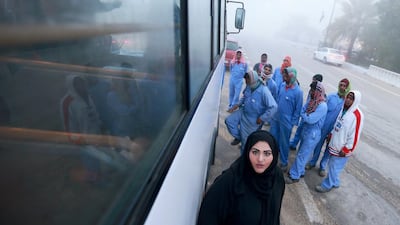Abu Dhabi // A faulty air conditioner in her car gave Shamma Al Zaabi insight into the discomfort labourers experience every day – and a determination to do something about it.
“I had just finished work and got into my car,” said the Emirati, 27. “I turned on the AC and it wouldn’t work. It was summer and the temperature was over 40°C.
“I called my brother and asked that someone pick me up because I couldn’t drive in this heat.”
But neither of Ms Al Zaabi’s brothers was nearby and nobody came to the rescue.
“My brother told me to drive home with the windows down and they would pick up the car to be fixed later,” she said.
“I did that but even with the windows down the heat and humidity were unbearable.”
A group of labourers were travelling by bus back to their camp at the same time.
“I looked to my side and saw these workers with their heads hanging out of open windows,” she said.
“I thought, if I couldn’t put up with having no air conditioning for less than an hour then how are these workers putting up with this every day?”
Ms Al Zaabi, who works for the Ministry of Interior, started to research why buses used to ferry labourers in the UAE were not air conditioned.
“I know that the UAE is a rich country that takes care of its people and gives workers their complete rights, so I was sure that there was a mistake somewhere,” she said.
After months of researching labour laws, Ms Al Zaabi found a clause that not only made air conditioning mandatory for workers' buses, but required all buses to be of the same standard.
“So the fault wasn’t from our laws,” she said.
Ms Al Zaabi discovered that air-conditioned buses are more expensive to lease, and companies often chose the cheaper option.
The price difference is Dh1,000 to Dh2,000 a month.
She submitted a suggestion to the human rights office at the Ministry of Interior, which forwarded a letter to the Ministry of Labour, asking them to look into the situation.
“The laws are in place but the fault lies with the implementation,” she said. “I don’t think companies should be given the option of having non-air conditioned buses.”
But a source at the Ministry of Labour, who did not want to be identified, said: “There is no law. This is part of specifications that came under a law.
“Having air-conditioned buses for labourers is unrealistic. These workers are at construction sites all day. They are sweaty.
"Putting them in an air-conditioned bus will only make them sick and spread diseases.
“Having the windows is important because of the smells and will cool them down. If you have the windows closed the stench will be unbearable for them.”
A decree from the Cabinet in 2009 approved a manual for General Criteria for Workers’ Accommodation. One is that all vehicles must be air conditioned.
It is also the employer’s responsibility to ensure all criteria are met, while the Ministry of Labour is responsible for ensuring the strict adherence and implementation of the manual’s provisions.
Ms Al Zaabi estimates that 70 per cent of workers' buses do not comply with safety standards.
“They are unfit to be on the road,” she said. “Some don’t even have hand rails. They are broken down and I have photographed all this and submitted it in a report.
“Also almost all the labourers I interviewed say that it gets really hot in the summer and they would like air conditioning.”
Ms Al Zaabi was last year recognised by the Ministry of Interior for her efforts and suggestions to improve workers’ transport.
The ministry said her work supported the UAE’s efforts to safeguard labourers’ rights on a national and international level.
Discussions about implementing the law and improving conditions are taking place between the two ministries.
salnuwais@thenational.ae

